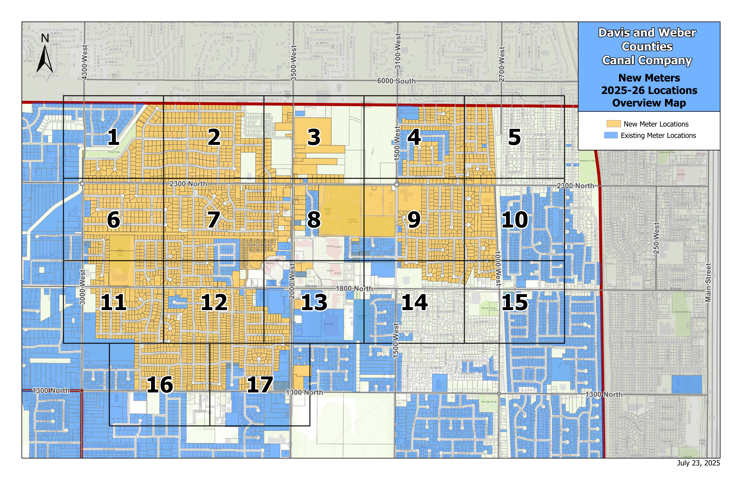Secondary Water Self Reporting
Your Water Conservancy District is committed to resolving any concerns or impacts to property promptly.
Your Water Conservancy District is committed to resolving any concerns or impacts to property promptly.
In 2022, Utah legislators passed House Bill 242 to have metered non-potable water throughout the state of Utah by the year 2030…
NOTE: This website covers only the water providers in the cities below. If you are in a different city, please contact your water provider directly.
Legislation passed by the Utah State Legislature in 2022 requires secondary water connections in Utah to have a meter by 2030.
Water systems throughout the state, as a result, will be installing meters until more than 200,000 connections are completed. Meter installation, combined with public education about responsible water use, has proven to be one of the state's most effective water conservation tools. Check out What's Happening In My Neighborhood below to get information on installations in your area.
A contractor will dig down to your secondary water connection.
A meter will be connected, helping you and your community water system better understand your use.
A meter box will be installed to protect, and give access to, the meter.
Landscaping around the excavated area will be restored as much as possible.
Secondary water meters installations are currently happening in Bountiful. Here are maps of the installation area that started in fall of 2024, and the overall project area with phases by year:

Installation of secondary meters in West Point and a small part of Clinton have begun and will finish up in 2025.
Existing meters may receive a new radio to better gather data. The rest of Clinton will receive meters over the next several years (2025-2028).
Watch for door hangers notifying when contractors will be in your area. The map shows the areas to have meters installed in 2025:

The area of Hooper served by Roy Water Conservancy District is complete. If you live in Hooper outside of this area, contact your service provider. Thank you!
Secondary meter installations in Kaysville are complete. Please call 801-810-5886 with any questions or concerns.
Please double check who your secondary provider is if you live in Layton. If you receive secondary water from Layton City, you will need to call them directly at 801-336-3720. All other providers use the hotline 801-810-5886.
Please call our hotline at 801-810-5886 with any questions or concerns.
Secondary meters are currently being installed. Please call 801-810-5886 with any questions or concerns.
West Bountiful installations are substantially complete. Contact us if there are any leaks, problems, or concerns.
If you have not had a meter installed yet, watch for mailers and/or door hangers to know when contractors will be in your area.
Secondary meters are currently being installed in the area of West Haven that is served by Roy Water Conservancy District.
Secondary water meters are currently being installed in this area. Please contact us via the hotline, project email, or through the website with any questions or concerns.

Orange areas on this map are areas where meters are being installed for this project. Click the appropriate arrow at left to see what is happening in your city.
Water efficiency: We can be more efficient with our water resources if we know how much we’re using. That’s where meters come in! Studies associated with secondary metering projects have found that metering can help property owners reduce water use up to 30% or more, just through education and by adjusting their outside watering. In addition, meters help detect leaks and other water supply problems.
Detect water waste: Previous metering efforts have revealed leaks that may have been going on for years, and users also had no idea how much water they were using, often leading to waste. Metering brings awareness to users and opens the door for education about using water more efficiently, which could result in water savings of more than 30 percent.
Regular supply: The water conserved this year may be next year's supply. With Utah's reservoirs lower than we’ve seen in a long time, we need to use less on our landscapes to ensure enough water for the coming summers. When we use less, that water can be used for our homes, businesses, and the environment.
